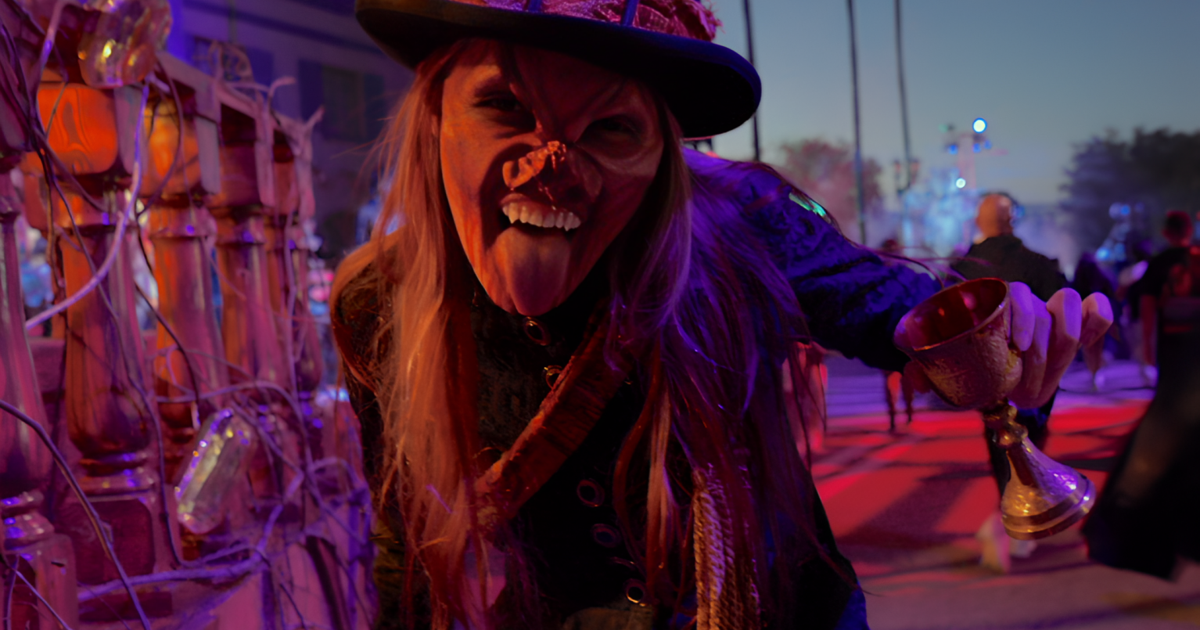UCF student and scare actor Caitlin Anderson creeps through Universal Orlando’s Halloween Horror Nights on Sunday. Anderson portrays a masquerade vampire in the event’s scare zone and has been a scare actor since 2021.
Melody Chacara
As the evening light fades over Universal Orlando Resort, guests’ screams echo throughout the park, fog fills the air and the eerie rhythm of music pulses like a mantra.
For some UCF students, this marks the beginning of their shifts. Nightly transformations involve slipping into makeup, masks and prosthetics to become part of Halloween Horror Nights’ cast of monsters.
Each student brings a different story to the thrill — some discovered the thrill by mere coincidence, while others have been chasing the rush for years.
Marina Davitellis, senior theme park and attractions management major, reflected that the chance to perform in such a large, distinct environment feels surreal.
“I loved going to the event,” Davitellis said. “And I had done scare acting back home in Germany for local haunts and stuff. I loved doing that, so being able to do it on a scale like this was really, really cool.”
For senior nursing major Caitlin Anderson, stepping into character means finding the fine line between instinct and performance.
“For the most part, they give you motivation in the roles,” Anderson said. “My role this year, they kind of just gave us different subsections of what we were supposed to act like.”
Anderson treats each night like a choreography — a careful focus on movement and timing.
“I think it depends on if you’re in a street or in a house,” Anderson said. “In the street, I think the buildup of making someone creeped out enough and then popping out to scare them, like, just staring at people in a certain way until they get uncomfortable, or catching people off guard — that’s my favorite part.”
Each performance relies on physicality and endurance. Jillian Nordhagen, senior entertainment management major, considers scare acting one of the most demanding jobs she’s ever had.
“Scare acting is a very physical job,” Nordhagen said. “You’re being told to do aggressive movements every three to five seconds for 45 minutes straight at least five times a night. That requires stamina.”
Jonas Dahlmann, a sophomore entertainment management major, takes on the role of a “spare” filling in for different characters across the event. He’s learned to adapt quickly, taking on new roles and finding ways to make each performance his own — the constant change and variety fuel his creativity.
“As you go through your night, you develop a sense of your character,” Dahlmann said. “You grow into it and think, ‘Oh, I can add this little bit of my personality into it in this way,’ that’s what makes it fun.”
Each new role, house and scare zone teaches Dahlmann something different, pushing him to grow with every performance.
“As a spare, I’ve learned to be very flexible,” Dahlmann said. “Not just in playing characters and roles, but in a workplace and being able to quickly adapt to different environments.”
But behind the scream and flickering lights, scare acting puts more at stake for these students. It also requires balancing the pressures of schoolwork.
“There are some days when I’m so exhausted I have to miss school, and some days where I’m so overwhelmed with school that I’ve had to call out of work,” Davitellis said. “So it really is just me doing my best at both of those places and giving myself to both of those places as much as possible.”
Anderson’s nights stretch into the early hours of the morning.
“Yeah, I think the earliest I go to bed sometimes is 4 a.m.,” Anderson said. “And then, yeah, I get off work at 2, and because of my prosthetic, it takes about ten minutes, but I have to wait in line to get it off because I can’t take it off myself. So, I get out at 2:30, I think the earliest, and then I get home at 3.”
Between long nights in the dark corners of haunted houses and a hectic school schedule, Nordhagen keeps the same discipline she brings to her work.
“Find certain times in the day or when you are not working to get your assignments done,” Nordhagen said. “If you don’t have enough time outside of work to get your assignment done, then work on it during your breaks at work.”
Over time, each of them has learned how to balance their coursework, exhaustion and the nightly thrill of performance. The discipline they’ve built in their characters and shifts carries into every part of their lives, not only shaping how they scare or act but also how they grow.
“I love that so much, especially as a performer,” Dahlmann said. “You kind of get to experiment with different things, do different roles, learn more about yourself at the same time while you’re doing it and learn what you’re good at, your strengths and your weaknesses.”

